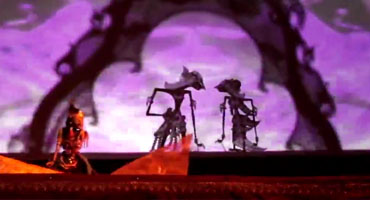
 I agree
I agree
.
Sumpah Pralaya [An Oath of Death] (2012)
Director: Aneng Kiswantoro
How to cite: Aneng Kiswantoro ([2012] 2016), Sumpah Pralaya [An Oath of Death], translation and notes by Miguel Escobar Varela, Jozina Vander Klok and Yosephin Novi Marginingrum. Singapore: Contemporary Wayang Archive. Retrieved from http://cwa-web.org/en/SumpahPralaya.
Summary
Abimanyu reminisces about the past and feels lost. He promised Dewi Utari he would never love another woman, or else he would die in the war. However, he has married a younger woman, who is now pregnant with Parikesit - the future heir of the Pandawa. The Korawa are planning a deadly attack on the Pandawa. Parikesit is the only person who can break this attack. He is fully aware that attempting this will result in his death, but he accepts his fate and marches into the battlefield to accomplish an important victory and be killed.
Story: Mahabharata
Music: Contemporary Gamelan
Space: Video Screen, Gedebog, Kelir
Performers: Multiple Dalang
Puppets: Modified Traditional, Wayang Kulit Puppets, Wayang Golek
Language: Javanese
Recording details
Notes: This performance was made as part of Aneng Kiswantoro's masters degree at ISI - Yogyakarta [Indonesian School of the Arts] with students from the bachelors' program in pedhalangan.
Produced by: National University of Singapore and Indonesian Visual Art Archive
Recording place: Institut Seni Indonesia, Yogyakarta
Addional credits
Assistant director: Fani Rikisnyah
Dalang: Catur Cang Pamungkas, Rohmat Susmanto, Anang Suwanda, Doni Nurjati Putra, Sujud Irawan, Sri Kawn, Hariyanto, Wahono, Mahmudi, Andi Wicaksana, Bayu Aji Nugraha, Mustika Bayu Wibowo, Restu Wijiyadi, Sukasih, Aga Petus Visual design
Musicians: Sawita, Dimas, Dianatama, Hariya Sumantri, Mujari, Wawan, Lingga
Singers: Eni Lestari, Elisa Orcarus Allaso, Siti Marfua
View the metadata record for this resource.
Translation and notes by Miguel Escobar Varela (MEV), Jozina Vander Klok (JVK) and Yosephin Novi Marginingrum (YNM).
1. According to Ki Aneng, these words are often used for a suluk in the classic representations of the story of Abimanyu's death, within the lakon known as Abimanyu Gugur. Utari is referenced as Abimanyu's grandmother [éyang]. Although Utari is not directly related to Abimanyu by blood, her mother (Rekatawati) was adopted by Palasara, who is the grandfather of Pandu and great-grandfather of Abimanyu. Rekatawati was made from a wood-peddle by Durgandini, Palasara's wife MEV.
2. Kamarutan [the wind blowing] possibly means that the small fires would become bigger with the wind YNM.
3. Sang Hyang Candra is the name of the moon in wayang MEV.
4. Sangga runggi means prejudices, or doubts JVK.
5. Pěnggalih is krama Inggil for heart. Literally the phrase says, "Is Utari the only one in your heart?" MEV.
6. Rinanjap, in the Javanese original, denotes an arrow attack launched from multiple directions at once MEV.
7. Tugu Sinungkarta is a statue to which people direct prayers YNM.
8. Mijil or wijil means to come forth. It seems the performer doubts for a moment on which form of the word to use JVK.
9. The preceding fragment narrates the dialogue that is to follow. In a traditional wayang it would be intoned as kandha [half-sung, half-spoken poetic narration] by the dalang MEV.
10. Example of a purwakanthi, a rhymed Javanese saying MEV.
11. Wahyu is a gift from the gods. Every kesatria [warrior] will receive one such gift from heaven. The three things to be found in life rhyme in the original enunciation (siji–pesthi, loro-jodoh, telu-wahyu) MEV.
12. Abimanyu's tears are said to have the power of cursing the land if they reach the soil MEV.
13. Běcik kětitik ala kětara [the good and bad will become known], is a popular Javanese saying MEV.
14. Arcapada, sometimes written as Marcapada, is the world of the mortals MEV.
15. This section is improvised and other languages such as Indonesian are used MEV.
16. Mbok here is used as a particle to indicate the speaker's tentativeness JVK.
17. Dul Gablek is the name of the guard MEV.
18. Nayaka refers to people under one's command JVK.
19. Sasmita is a signal from the Kings or Gods. Sometimes the cues from the dalang to the musicians are also referred to as sasmita MEV.
20. Pamit means taking leave from someone MEV.
21. Kokop means drinking with both hands YNM.
22. Sekar Tanjung pasanggrahan is the headquarters of the Pandawa during the war YNM.
23. This question is in Ngoko JVK.
24. This question is in Krama JVK.
25. The son of Abimanyu will be known as Parikesit. His story is found in Nanang Hape's performance Kalimataya in this archive MEV.
26. Jagat Déwa Bhatara! is often used as an expression of anger in wayang MEV.
27. Kyai Udan Mas [the sacred rain] has a symbolic meaning. Abimanyu's death as the moon represents the cycle of the seasons and the renewal of the land MEV.
28. Layu is a poetic word to indicate someone's passing MEV.
The honorifics in the original languages were retained in the subtitles. In Javanese and Indonesian, speakers address their interlocutors with over 40 different honorifics which denote differences in their relative status and level of intimacy.
ID = Indonesian
JW = Javanese
Adik. ID. Younger brother/sister. It is used for addressing younger people, not necessarily one's relatives.
Adinda. ID. Younger sister. More intimate than adik.
Babé. ID/Betawi. Familiar form of father, commonly used in Jakarta.
Bé. ID/Betawi. Short form of Babé, father. Jakartan slang.
Bang. ID. Older brother, short form of abang. If used with non-relatives, it is has the connotation of a slang, and is somewhat equivalent to “man” in English.
Bĕndara. JW. Master.
Bibi. JW/ID. Aunt. A way of addressing/referring to older women.
Bos. ID/JW. An adaptation of the English "boss". Used either to refer to one's superior or to a friend in a joking context, for example, when a person orders others around without realizing he/she is doing so.
Bu. ID/JW. Short form of ibu, mother.
Bung. ID. Similar to bang, but slightly less formal. It might mean "comrade". The political leaders of the independence war are often referred to with this term, for example Sukarno is often referred to as
Bung Karno.
Dara. JW. Short form of bĕndara, master.
Dèn. JW. Sir, master, used to address royalty. Short form of radèn.
Dhé. JW. Short form of pakdhé, uncle.
Dhik. JW. Short form of adhik. Younger brother/sister. It is used for addressing younger people, not necessarily one's relatives.
Éyang. JW. Grandfather.
Dimas. JW. Younger brother.
Gusti. JW. Lord. Used to address superiors and Gods.
Ibu. JW/ID. Mother. Used generically to address women who are older than the speaker.
Kakang. JW. Older brother.
Kakang mbok. JW. Older sister.
Kanda. ID. Older brother. Formal.
Kang. JW. Older brother. Informal.
Kangmas. JW. Older brother.
Kaki. JW. Uncle
Kang. JW. Older brother, used generically for men older than the speaker. It is a shortened version of kangmas).
Kakak. JW/ID. Older brother/sister, used generically for people who are older than the speaker.
Lé. JW. Son, short version of tholé.
Lik. JW. Often used between friends as a slang term of address. Uncle, "little father." Short form of {paklik}.
Ma. JW. Same as pak, short form of rama.
Mbak. JW/ID. Older sister. Used generically for women who are slightly older than the speaker.
Mamang. ID. Uncle.
Mang. ID. Uncle, short form of mamang.
Mas. ID. Older brother, used generically for men who are older than the speaker. Although it is also a shortened version of the Javanese kangmas people prefer to use mas in Indonesian and kang in Javanese.
Mas bro. ID. Slang used among male friends. In a way, it is a reduplication.
Mbah. JW/ID Grandfather, grandmother. It is used generically to address people who are much older than the speaker. Short form of simbah.
Mbok. JW. Mother, short form of simbok. Used generically for women who are older than the speaker.
Mbokdhé. JW. Aunt. Literally, "big mother".
Mbul. JW. Informal term of address between close male friends.
Ndara. JW. Master.
Nduk. JW. Daughter, short form of gĕndhuk.
Nggèr. JW. Son, short form of anggèr Used generically for people who are younger than the speaker, with whom the speaker is on intimate terms.
Nimas. JW. Younger sister.
Nok. JW. West Javanese term for daughter, short form of dhénok.
Nona. ID. Miss, unmarried woman.
Paduka. ID. Your Excellency.
Pak. JW/ID. Father, used generically for men who are older than the speaker.
Pakdhé. JW. Uncle. Used to refer to a man who is older than one's father.
Paman. ID. Uncle. Used to refer to a man who is older than one's father.
Pangéran. JW/ID. Prince.
Prabu. JW. King.
Radén. JW. Master, used for royalty.
Rama. JW. Father. It can also be used to designate catholic priests when one is speaking in Indonesian.
Simbah. JW/ID Grandfather, grandmother. It is used generically to address people who are much older than the speaker.
Sinuwun. JW. Very formal way to address a man, reserved for sultans, kings and Gods.
Siwa. JW. Term for addressing older people.
Siwak. JW. Same as Siwa. Term for addressing older people.
Tholé. JW. Son
Tuan. ID. In colonial contexts, this is the way foreigners are addressed but it can also mean sir.
Wa Nĕrpati. JW. Uncle king, equivalent to the Indonesian paman raja.
Wa. JW. For addressing older people, short form of siwa.
Yayi. JW. Younger brother/sister.
Yunda. JW. Older sister.
See the Translation conventions.
Share:
in the translations or data.
